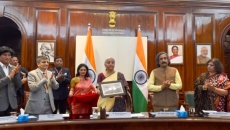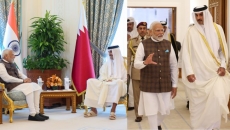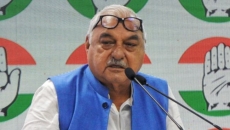He also termed the formula of “auctioning PM's post” a scary proposal “which will shatter your (citizens) dreams”.
What is worth noting is that Maha Vikas Aghadi's (MVA) weeks-long struggle to reach a seat-sharing agreement for the Lok Sabha elections could be indicative of the challenges inherent in coalition governance, where the constituents reportedly insisted on a big share in the exercise.
Moreover, the release of separate manifestos by opposition bloc constituents can indeed be interpreted as a sign of disagreement within a coalition. Normally, people expect that in a well-functioning coalition, parties typically aim to present a unified agenda and vision to the electorate through a single manifesto, reflecting their shared goals and priorities.
The fact that in a coalition government, where power is shared among multiple parties, consensus-building becomes a difficult task cannot be ignored. PM Modi’s statement implied that each coalition partner may have its own priorities and agendas, which can lead to negotiations and compromises in policymaking.
Nothing could explain “the compromises and compulsions” of a coalition dispensation any better than former PM Manmohan Singh’s February 2011 statement in which he had candidly admitted that he had to make “some compromises” to run a coalition government.
On the re-induction of DMK’s A Raja into the UPA Cabinet in 2009 as the Telecom Minister despite complaints against him, Manmohan Singh had said “his hands were tied by coalition politics”.
During the tenure of the Manmohan Singh-led UPA government, there were indeed instances where internal and external security faced challenges due to various factors, including “pressure groups”.
This portrays a picture of the multi-party UPA government that faced challenges such as policy paralysis and corruption scandals for 10 years (2004-2014). In fact, the UPA government's tenure was characterised by coalition politics, which sometimes led to compromises and slower decision-making.
In contrast, the Modi government's tenure has been marked by a more assertive leadership style and a focus on economic reforms, infrastructure development, robust internal and external security, and bold foreign policy initiatives.
The debate dominating public discourse is that a majority government led by a single party, as implied by PM Modi’s statement, often provides stability and decisiveness in decision-making.
On the other hand, coalition governments, while potentially more representative, may face challenges in consensus-building and stability due to the need to accommodate diverse coalition partners.
The Modi government, which is majority dispensation, has indeed been known for making bold decisions in various domains, including defence and economic policy.
The Surgical Strike, the Balakot air strike, GST, the Insolvency and Bankruptcy Code for debt recovery and restructuring, etc, were some of the bold decisions that reflect the Modi government’s proactive approach to addressing key challenges facing India, whether in the realm of national security or economic governance.
Analysts believe that these decisions underscore the government’s commitment to taking decisive action in pursuit of its policy objectives. The decision of the Modi government to continue buying oil from Russia despite international pressure could be seen as a bold move.
There is no denying that the people of the country in the past have, understandably, been concerned about periods of political instability as a result of what is widely known as ‘khichdi governments’ and their potential impact on national security and the economy.
What is clear is that with a strong mandate from the electorate, strong governments with full majority can swiftly implement their policies and agendas without the need for extensive negotiation or compromise. This can be particularly advantageous in times of crisis or when bold reforms are necessary to address pressing issues.
The entire country witnessed how frequent changes in government and leadership as was seen during the short regimes led by Inder Kumar Gujral (1997-98), Chandrashekhar (1990-91), HD Deve Gowda (1996-97) and VP Singh (1989-90) led to uncertainty in economic policies, policy inconsistencies, and fluctuations in foreign policy priorities.
Political analysts and security experts are of the view that the national security of the country was compromised when such unstable political coalitions were in power in Delhi. For instance, the policy watchers refer to the Gujral Doctrine which received a significant push when I.K. Gujral was leading a 'khichdi' government in the late 90s.
The Gujral Doctrine, named after the former Prime Minister, which was touted as a policy emphasising goodwill gestures and non-reciprocal concessions towards India's neighbors, including Pakistan, to foster better relations and promote peace, in fact, met with disapproval from critics who argued that it compromised India's security interests, especially considering the volatile nature of relations with Pakistan.
Some experts say that during former PM Gujral’s time, the Indian intelligence network in Pakistan came in for multiple and major setbacks.
During the 1980s, there used to be two Counter Intelligence Teams (CITs) in Pakistan for multiple actions against terror organisations. But during the Gujral regime, both these teams were dismantled and the extensive intelligence network in the neighbouring country was reduced, said experts who once worked with the security establishments in Delhi.
A security expert told IANS that Gujral, who was PM for 11 months only, ended R&AW’s offensive covert operations capabilities against Pakistan.
“He preferred to have peace with Pakistan as part of his overall foreign policy known as the Gujral Doctrine,” security experts point out.
With these facts in background, PM Modi sought to highlight the point that a strong government is beneficial for various reasons, such as efficient decision-making, rapid implementation of policies, and strong leadership, which were all missing in the 'khichdi' regimes.
Vindicating PM Modi’s remarks, opposition leaders were seen vying for the position of Prime Minister which reflected the complexities of coalition politics.
Bihar CM Nitish Kumar and RJD chief Lalu Prasad were unhappy with Mamata Banerjee proposing Congress chief Mallikarjun Kharge’s name as PM candidate some time back. Nitish Kumar finally severed ties with the bloc. In what is creating confusion among the voters, there is a complete lack of unity between INDIA bloc constituents like the Congress and the CPI-M in Kerala, and between the Congress and the Trinamool Congress in West Bengal, which underscores the complexities of coalition politics.
With such political ambitions and regional aspirations at play, India has been witness to frequent occurrences of elections at short intervals imposing a financial burden on the public, both in terms of direct costs and indirect economic impacts.
Several ‘khichdi’ governments could not complete a full term, leading to mid-term polls.
The Janata Party government led by Morarji Desai (1977-80) succumbed to internal conflict. Moreover, the National Front coalition government led by VP Singh (1989-1991) could not last long after Mandir and Mandal politics stirred unrest across the polarised nation.
The United Front government of 13 political parties came into being in 1996. It formed two governments between 1996 and 1998 during which the regime was led by two PMs belonging to Janata Dal – H.D. Deve Gowda and I.K. Gujral.
Going by the hypothetical scenario of the INDI Alliance forming the government, and multiple leaders from different parties rotating the Prime Minister post annually, one could foresee potential challenges in maintaining stability and coherence in governance.
Undoubtedly, such instability may lead to policy inconsistencies and hinder long-term strategic planning, including in matters of national security and the economy.






